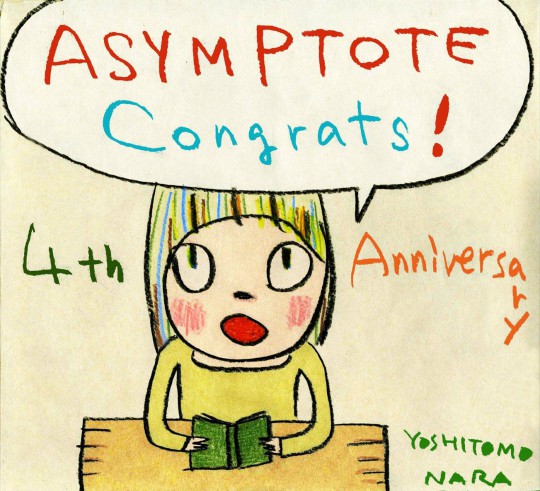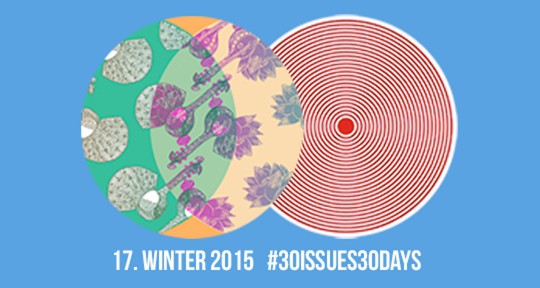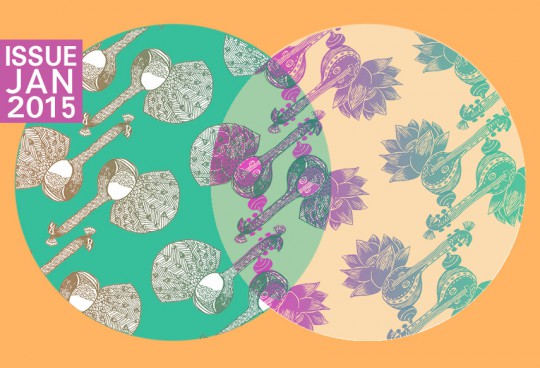If you’re just joining us, we invite you to revisit our first 16 issues via our #30issues30days showcase here. In honor of our milestone 30th edition, we’ll shortly be launching a contest giveaway with a top prize of $200, so watch this space!
2015 was a milestone year for Asymptote: We won a London Book Fair award and partnered with The Guardian. But only Asymptote staff back then know we almost didn’t make it past January. On 15 December 2014, despairing of the lack of progress in fundraising, I wrote the following (lightly edited) email:
“Hello team, I’ve been reassessing the situation. It seems I underestimated the support for the magazine and it doesn’t look as if we’re going to hit our campaign target by December 19. Therefore, we’ll be extending the deadline to January 29, 2015. Our January issue will be pushed back to January 30, the very date of our debut in 2011, four years ago, so that we’ll have come full circle. If we don’t hit the target on January 29, we will announce in the editorial that the Jan 2015 issue will be our very last. Social media and blog activities (including the podcast, very sadly) shall cease with effect from 1 Feb. The magazine will fold. Planning for all activities after January should be halted with immediate effect. Please respect this. Section editors, please do not communicate any more acceptances, and please be prepared to rescind your acceptances for anything after the January issue on the event of our closure, if it does come to that. As promised, we will break for the holidays. (I’ll hold the fort on social media during this time.) In January, we will prioritize work on the January edition as well as the two January events. As for those who are willing to help, we will keep publicizing the IndieGoGo campaign and sending out appeals. We’ll see if the magazine can be saved. (During a recent discussion with the senior editors, the question did arise about whether to shield all of you from the hard reality in front of us. But I don’t think it’s good to keep mum, for morale’s sake; also, I would not be so cruel as to ask you to continue working on projects that may not see the light of publication, or events that have to be cancelled. The reality is that I am simply out of funds, and also depleted in other ways. If we don’t hit the IndieGoGo target, I would prefer to end on a high note and move on.)”
Here to introduce our Winter 2015 issue, released one day after 287 supporters brought us past the finish line of $25,000, please welcome Assistant Editor Victoria Livingstone.
“I am always trying to push the market very hard,” David Damrosch told Asymptote contributing editor Dylan Suher in an interview included in the Winter 2015 issue. The Harvard professor of comparative literature explained that he strives to bring so-called minor literatures into the canon of world literature by translating, anthologizing, and teaching works from underrepresented regions and languages.
Asymptote has been similarly pushing against the market since Lee Yew Leong founded the journal in 2011. When the Winter 2015 issue was published, I was finishing my doctoral work, which focused on connections between political contexts and translated literature. As I was immersed in the work of critics such as Damrosch, I was also reading Asymptote, and I recognized then that that the journal was doing something different. Rather than reproducing the inequalities of what Pascale Casanova calls “the world republic of letters,” Asymptote was giving—and continues to give—voice to languages and regions across the globe without ever lowering the curatorial bar.
The January 2015 issue presents literature translated from twenty languages, including Dari, Indonesian, and Albanian. In addition to reacquainting us with well-known authors like Russian writer Andrey Platonovich Platonov and Brazilian poet Augusto de Campos, it introduces us to younger and less established writers, including Bulgarian playwright Yasen Vasilev and Danish novelist Josefine Klougart.
Much of the writing in this issue deals with loss, either in the personal lives of protagonists or in the context of tragedies that affected whole societies. In this excerpt from Klougart’s novel, translated by Martin Aitken, the narrator reflects on her own mortality as she watches her dying mother:
She sleeps at once, without transition, departs the room, lying so completely still. For years you don’t notice, but then it becomes so clear, death in one’s own mother; you see your grandmother in her, her own mother in her. And in fact another face still, recognisable, and yet unfamiliar. A disconcerting face, this third one.
Then she turns over onto her side and sleeps on.
Then turns and sleeps again.
More than once: a face, my mother’s face, disappearing. And the third face that can only be my own, the only explanation, mine.
Like Klougart, Italian poet Pierluigi Cappello ponders the passage of time. “The Highway,” translated by Todd Portnowitz, ends with these dark and beautiful lines:
Tomorrow, yes, even here we’ll be covered in leaves,
the tide may come to a halt on its own
but no one can make it stop
and inside these crude meters we live our lives
and to live is to carry what’s been shed,
to one day at a time compose its name.
A number of works in this issue address loss on a broader scale. An excerpt from Durs Grünbein’s Porcelain: Poem on the Downfall of my City, translated by Monika Cassel, describes the fall of Dresden, while Syrian poet Dara Abdallah wonders “[w]ho among us remembers the faces of those killed in massacres.” The voice of Nadia Anjuman, a Dari poet who survived the Taliban regime in Afghanistan but died tragically as a victim of domestic violence, is also represented in this issue. In the translation by Diana Arterian and Marina Omar, Anjuman asks,
Will the dawn of your ideas—
those blue-bright thoughts
in the eyes of the storm-born fish
afraid of pouring darkness—
become the face of hope?
Other pieces explore political and historical realities by asking us to consider what it means to move between linguistic and cultural spaces. Iranian artist Farhad Fozouni’s three-dimensional poetry encourages viewers to approach his work from multiple angles. In one of his poems, we can read English in one direction, and Farsi in the other. In another exploration of language and cultural identity, S. J. Naudé writes about translating his own work from Afrikaans to English. Perhaps because my parents emigrated from South Africa during the Apartheid era, I was particularly struck by Naudé’s reminder that there, “everything is politics. It is impossible to reflect on the translation of literary work from Afrikaans to English without first becoming entangled in at least the rudiments of some of the language and literary politics in South Africa during and after Apartheid.” Explaining his decision to write in Afrikaans when texts in English circulate more easily in the global market, Naudé says, “There is, of course, something perverse and exhilarating about refusing to be understood, about seeking out the margins. About turning one’s back on the rules governing the accumulation of capital (whether symbolic, intellectual, or monetary).”
This issue of Asymptote—like all the others, and like Naudé and Damrosch—asks us to explore the margins. Whether they delve into politics and language or the dark spaces of tragedy, the pieces in this issue expand world literary space in marvelous ways.
Victoria Livingstone, an Assistant Editor with Asymptote since January 2017, will assume a new role as co-editor of the Writers on Writers section from October 2018 onwards.

*****
Read more from our #30issues30days showcase:


